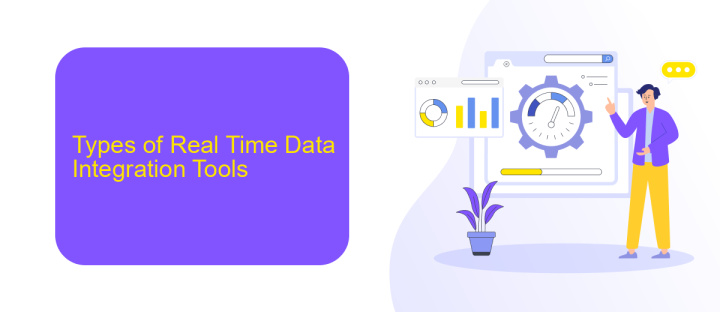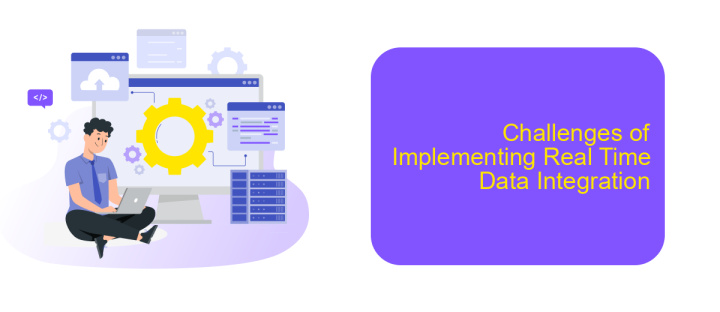Real Time Data Integration Tools
Real-time data integration tools are essential for modern businesses seeking to leverage timely and accurate information. These tools enable seamless data flow between disparate systems, ensuring that decision-makers have access to the most current data. By facilitating immediate data synchronization, they enhance operational efficiency, foster better decision-making, and support dynamic business environments that require instant insights.
Introduction
In today's fast-paced digital landscape, real-time data integration tools have become essential for businesses looking to streamline operations and make data-driven decisions. These tools enable seamless data flow between various systems, ensuring that information is up-to-date and readily available for analysis. One such tool that has gained popularity is ApiX-Drive, which offers a user-friendly interface for setting up integrations without requiring extensive technical expertise.
- Enhanced data accuracy and consistency
- Improved operational efficiency
- Faster decision-making processes
- Scalability to accommodate growing data needs
- Cost savings through automation
By leveraging real-time data integration tools like ApiX-Drive, organizations can break down data silos and ensure that critical information flows seamlessly across different platforms. This not only enhances collaboration but also empowers businesses to respond swiftly to market changes and customer demands. As a result, the adoption of these tools is becoming increasingly vital for maintaining a competitive edge.
Types of Real Time Data Integration Tools

Real-time data integration tools can be broadly categorized into several types based on their functionality and use cases. One common type is ETL (Extract, Transform, Load) tools, which are designed to extract data from various sources, transform it into a suitable format, and load it into a target system in real-time. These tools are essential for businesses that need to integrate data from multiple platforms, ensuring that the information is always up-to-date and accessible. Examples of such tools include Talend and Apache Nifi, which offer robust solutions for real-time data processing and integration.
Another type of real-time data integration tool focuses on API-based integrations. These tools facilitate seamless data exchange between different applications and services using APIs. ApiX-Drive, for instance, is a powerful service that allows users to set up integrations without any coding knowledge. It supports a wide range of applications and automates data transfer in real-time, making it easier for businesses to synchronize their data across various platforms. Other notable tools in this category include Zapier and Integromat, which offer user-friendly interfaces and extensive integration capabilities.
Benefits of Using Real Time Data Integration Tools

Real-time data integration tools are essential for businesses aiming to stay competitive in today's fast-paced environment. These tools provide seamless data flow between various systems, ensuring that information is accurate and up-to-date across all platforms.
- Improved Decision-Making: Real-time data allows for quick, informed decisions, enhancing business agility.
- Increased Efficiency: Automated processes reduce manual data entry and errors, saving time and resources.
- Enhanced Customer Experience: Immediate access to data enables personalized and timely customer interactions.
- Scalability: Tools like ApiX-Drive offer scalable solutions that grow with your business needs.
- Cost Savings: Reducing the need for manual intervention lowers operational costs and increases ROI.
Integrating real-time data tools such as ApiX-Drive can streamline your business operations, providing a unified view of your data. This not only enhances productivity but also ensures that you can respond swiftly to market changes and customer demands, maintaining a competitive edge.
Challenges of Implementing Real Time Data Integration

Implementing real-time data integration poses several challenges that organizations must address to ensure seamless and efficient operations. One of the primary challenges is ensuring data consistency and accuracy across multiple sources, as real-time data streams can often be complex and prone to discrepancies.
Another significant challenge is managing the performance and scalability of data integration systems. As the volume of data increases, integration tools must be capable of handling high throughput and low latency to maintain real-time processing capabilities.
- Data consistency and accuracy
- Performance and scalability
- Data security and privacy
- Integration with legacy systems
Additionally, ensuring data security and privacy is crucial, as real-time data often includes sensitive information that must be protected. Tools like ApiX-Drive can help streamline the integration process by providing automated workflows and real-time data synchronization, reducing the complexity and effort required to manage these challenges.


Conclusion
In conclusion, real-time data integration tools are essential for businesses seeking to enhance their data-driven decision-making processes. These tools provide seamless connectivity between disparate data sources, enabling organizations to access up-to-date information instantly. By leveraging real-time data integration, companies can improve operational efficiency, reduce latency, and make more informed decisions, ultimately driving growth and competitiveness in the market.
One notable example is ApiX-Drive, a service that simplifies the integration of various applications and systems. With its user-friendly interface and robust capabilities, ApiX-Drive allows businesses to automate data flows and synchronize information across platforms without the need for extensive coding knowledge. This not only saves time and resources but also ensures data accuracy and consistency. As the demand for real-time data integration continues to grow, tools like ApiX-Drive will play a crucial role in helping organizations stay agile and responsive in an increasingly data-centric world.
FAQ
What is real-time data integration?
Why is real-time data integration important?
What are the common challenges in real-time data integration?
How can I automate real-time data integration?
What should I look for in a real-time data integration tool?
Apix-Drive is a universal tool that will quickly streamline any workflow, freeing you from routine and possible financial losses. Try ApiX-Drive in action and see how useful it is for you personally. In the meantime, when you are setting up connections between systems, think about where you are investing your free time, because now you will have much more of it.

